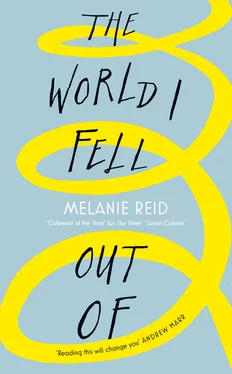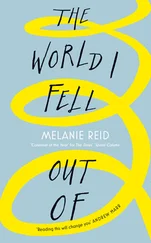1 ...8 9 10 12 13 14 ...17 They gave as good as they got, those fast-talking, insouciant Glasgow girls. Lupin, her uniform straining over her fabulous bust, had spent the morning crouching on the floors of bathrooms, beside arse after arse, evacuating poo. Later she sounded off to some of us, the patients she trusted, about being criticised by one of the consultants.
‘He’s like complaining it was too smelly when he was doing the ward round.’
She threw her hands out, paused for effect.
‘I’m like, “No shit Sherlock!”’
‘Did you really say that?’
‘You kidding?’
For us, new trainees in the hard school of double incontinence, this was the start of an entirely different way of life. We laughed about our plight when things went particularly wrong, forged together by the dark humour, the dry-as-dust jokes, the human condition stripped to its most primitive. It was, I guess, like a PoW camp. With it went an undercurrent of real camaraderie, a shared acknowledgement of our common misery. Up and dressed one mid-afternoon, a dozen or so of us were parked in our wheelchairs in a polite semicircle, staring at the wall onto which was projected the first slide of a PowerPoint presentation. And one of our number, a distinguished man who had boarded a plane at Heathrow but when it landed was unable to stand up because he had suffered a spinal stroke, leant over from his wheelchair towards mine and muttered:
‘Did you ever imagine a situation where you would sit gazing intently at the words “Bowel Management”?’
Indeed, there were far too many things beyond the power of imagination and they were pressing in on us. We got detailed tutorials. We were as mordant as we could be, for without a highly developed sense of the ridiculous, how else could we cope with bleak forty-five-minute lectures about suppositories, peristalsis and sphincters; or indeed, in subsequent sessions, about pressure sores, catheterisation techniques and the risks of a deadly condition called autonomic dysreflexia? We were awake yet trapped in an undergraduate’s anxiety nightmare, where you dream you’ve committed to study entirely the wrong course. There had been some terrible mistake. You wanted to do English Literature; you were stuck in theoretical astrophysics. And in this university there was no dropping out, no transferring. To this day, I have lodged in my memory one particular giant image of a bedsore on a buttock which was displayed on the wall for us during those afternoon education sessions.
‘This sore is the size of a plate,’ warned the nurse in charge.
‘It had to be packed every day and the person had to spend two years in bed before they were able to sit up in a chair again. It is what can happen if you do not check your skin and take efforts to relieve pressure points.’
I looked at plates differently after that.
Most definitely beyond imagination were the backstories of my fellow patients: the extraordinary mixture of bizarre and mundane which had brought us together. We were a community bound by the common possession of crushed or severed spinal cords, but the disparate tales of how it came to happen were far, far stranger than fiction. Any woman who has given birth in an NHS hospital will know what it’s like to share a ward with the fantastic, comic mix of rough and ready, posh and precious, and every kind of female in between, whose only common bond is the ability to have a baby. Well, breaking your back is like that but magnified a millionfold. If you tried, you could not have made us up. Academics, labourers, wasters, tradesmen, accountants, failed suicides, business managers, teenagers, drunks, cyclists, stuntmen, farmers, speedway riders, criminals, jockeys, teachers, police officers, motorbikers, dog-walkers, golfers, drug addicts, teachers, pensioners and more congregate in spinal units. We were young, old, decrepit, well-groomed, inarticulate, intellectual, deranged, gay, straight and transgender, condemned to our wheelchairs by road accidents, falls from bikes or horses or walls or beds or cliffs or balconies, stumbles off kerbs, trips over slippers or coffee table or dog leads or manhole covers, crashes on the piste, dives into swimming pools, rugby tackles, violent assaults, attempted murder, war, vascular incidents or complications from tumour operations. Several were victims of slipping on ice. Men outnumbered women by almost ten to one. Every one of us had our own bitter misinterpretation of risk to reflect on. What we had in common is that life, quite simply, chose to leap out and attack us. As one nurse put it: ‘When I first came to work here I was terrified of the chance of spinal injury happening. Then I saw that it can happen to anyone, in any circumstance. It is completely random so I stopped worrying.’
This did not stop us, as individuals, in private moments, being haunted by our ‘what ifs’. What if I’d left the bike at home. Or pulled up the horse. Or not got in the car. But such thoughts were entirely pointless, jousting with the random essence of existence. Meantime, I decided, even if I couldn’t move, there was at least some fleeting entertainment to be had watching and listening to my fellow travellers. It was, I supposed, like being on a cruise ship.
The rehab ward was subdivided into rooms of four or six beds. One of these, opposite the nurses’ station, was a dedicated respiratory section for those poor sods who were on tracheotomies in order to breathe. They remained strangers to most of us, as they never rose from bed to wheelchair, and were too sick and dependent to reach the gym. People with such high-level neck injuries stayed as long as it took to stabilise them and arrange the massive twenty-four/seven care packages they would need at home. Then they were taken away at quiet times: still, distant figures upon stretchers beset by tubes and ventilators.
I remember catching a glimpse through the internal ward glass of one occupant: a morbidly obese man, not old by any means, who lay like a mountain upon what seemed an impossibly small bed, the tubes through the front of his throat, his face turned impassively towards the outside window. He did not live long enough to go home: one morning the staff came and drew all the internal curtains in the wards, shut the doors and hushed our buzzers, because his body was being removed and we were not to see. His accident had probably been caused by a fall – the most common cause of calamity. But oh what variety was contained within that tiny little word ‘fall’: it included everything from failed suicide to a trip over the coffee table in the living room after, or even before, a glass of wine, or sometimes six. All of human life was there in the lurid, eye-popping diversity of falling. There was Del, a part-time brickie and a full-time wild man, who had swallow-dived from the seventh floor on holiday in the Costas, convinced by drugs and alcohol he could fly. Despite his injuries, I think he still thought he could. He also thought he was irresistible to women and was famous for making lecherous comments to staff and female patients. Some weeks later, when I was upright in the gym on a static wooden standing frame, braced upright between foam knee braces and leather straps behind my bottom, I became aware of Del in his wheelchair at my right hip, leering.
‘You look OK standing up. For an old bird,’ he said. ‘I’d have a bit of that.’
‘In your dreams,’ I said as haughtily as I could, trying not to laugh at the pitch-black irony of a pick-up line from one deranged tetraplegic to another marginally less deranged; indeed, at the very suggestion either of us had sexual currency of any kind. How to plumb the depths of bitter-sweet. Later I rationalised that as offers went, given my condition, it was probably the best I was ever going to get.
He cackled and rolled off to pester someone else. I felt as if I had joined some hilariously macabre list of Dickensian characters. Tenement had done much the same thing as Del but on a lesser scale, a chronic alcoholic who had lost his house keys and fallen while trying to climb in the window to his third-floor flat. If his life had been chaotic beforehand, it was hopeless now. His hands jangled like a medieval palsy sufferer’s, and it was nothing to do with his broken spine. The stuff his girlfriend smuggled in for him could only assist. Despite encouragement he never showed up for gym sessions; he preferred to go outside and join the smokers, the small band of paralysed who huddled their chairs near the entrance to the spinal unit. Out there too was Steroid, a scaffolder who told the doctors he had tripped but confided to us in hand therapy, where he was learning to feed himself, that he’d run into a wall in a drug-induced rage and broken his own neck.
Читать дальше












